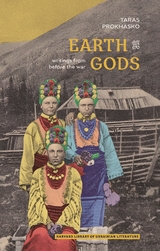
Earth Gods presents the early writings of Taras Prokhasko, one of Ukraine’s most prominent contemporary writers. Collected here for the first time in one book, these works span various genres yet form a single chronicle. Anna’s Other Days, Prokhasko’s first publication, testifies to the desire to free Ukrainian culture of overt influences of voices, styles, and genres that have dominated it for centuries. FM Galicia collects reflections delivered by the author at a Ukrainian radio show over a five-month period. Emphasizing the relevance of the oral genre as the origin of the text, Prokhasko has created a unique diary that strives to exist outside of literature and invites the reader to meditate on the human condition. The UnSimple—a novel whose action unfolds between the two world wars near Ialivets, in the Ukrainian Carpathian Mountains—documents the collapse of the grand narratives of the past, embodied here by the Carpathian earth gods who, despite their magical powers, are unable to save the patriarchal community they’ve been entrusted with from being overrun by the forces of modernization.
A master of reflexive, finely nuanced prose, Prokhasko weaves together narrative strands testifying to the sophistication and integration of Ukrainian culture with the world.
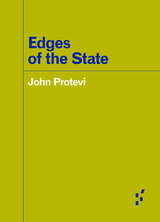
Using philosophical and scientific work to engage the perennial question of human nature
This book takes a look at the formation, and edges, of states: their breakdowns and attempts to repair them, and their encounters with non-state peoples. It draws upon anthropology, political philosophy, neuroscience, evolutionary biology, child developmental psychology, and other fields to look at states as projects of constructing “bodies politic,” where the civic and the somatic intersect. John Protevi asserts that humans are predisposed to “prosociality,” or being emotionally invested in social partners and patterns. With readings from Jean-Jacques Rousseau and James C. Scott; a critique of the assumption of widespread pre-state warfare as a selection pressure for the evolution of human prosociality and altruism; and an examination of the different “economies of violence” of state and non-state societies, Edges of the State sketches a notion of prosocial human nature and its attendant normative maxims.
Forerunners: Ideas First
Short books of thought-in-process scholarship, where intense analysis, questioning, and speculation take the lead






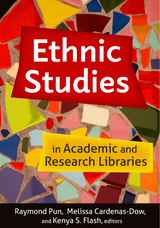
Ethnic Studies in Academic and Research Libraries serves as a snapshot of critical work that library workers are doing to support ethnic studies, including areas focusing on ethnic and racial experiences across the disciplines. Other curriculums or programs may emphasize race, migration, and diasporic studies, and these intersecting areas are highlighted to ensure work supporting ethnic studies is not solely defined by a discipline, but by commitment to programs that uplift underserved and underrepresented ethnic communities and communities of color. Twenty chapters are broken into three thorough sections:
- Instruction, Liaison Engagement, and Outreach
- Collections Projects and Programs
- Collaborations, Special Projects, and Community Partnerships
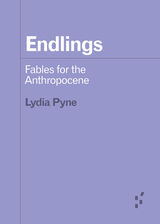
Amid the historical decimation of species around the globe, a new way into the language of loss
An endling is the last known individual of a species; when that individual dies, the species becomes extinct. These “last individuals” are poignant characters in the stories that humans tell themselves about today’s Anthropocene. In this evocative work, Lydia Pyne explores how discussion about endlings—how we tell their histories—draws on deep traditions of storytelling across a variety of narrative types that go well beyond the science of these species’ biology or their evolutionary history.
Endlings provides a useful and thoughtful discussion of species concepts: how species start and how (and why) they end, what it means to be a “charismatic” species, the effects of rewilding, and what makes species extinction different in this era. From Benjamin the thylacine to Celia the ibex to Lonesome George the Galápagos tortoise, endlings, Pyne shows, have the power to shape how we think about grief, mourning, and loss amid the world’s sixth mass extinction.



A complex and moving novel about modern Jewish identity, Elsewhere takes aim at a number of sensitive issues, including nationalism, Zionism, collective guilt, the Holocaust, and Israel itself. As heartfelt and surprising as it is hilarious, it pokes fun at the things we care about in order to get at what really matters.

An Equal Share of Freedom sheds new light on several important and interrelated dimensions of American, Jewish, and world history in the World War I era. Paying close attention to the Balfour Declaration as a hub around which to explore the period’s unfolding and turbulent social, cultural, and political developments, this collection of essays covers a diverse range of topics including Jewish doughboys, Zionist women authors, and political elites such as Golda Meir and Woodrow Wilson. The volume demonstrates the complex nature of Jewish ethnonational consciousness in the American setting and the impact of Zionism on US wartime and postwar activity.
The essays in this volume overturn timeworn assumptions that have long shaped the fields of American history and modern Jewish history. Taken as a whole, they demonstrate the war’s profound impact on American Jewish life and the transformation of American Jewry’s relationship with wider American society. These essays also illustrate the centrality of Zionism to the American Jewish experience and the extent to which American Jewry’s national consciousness and the future direction of the Zionist project were forged in the crucible of the Great War. An Equal Share of Freedom is the first volume in the Jacob Rader Marcus Series on the American Jewish Experience. In this series, Raider, Segev, and Zola highlight the myriad possibilities for expanding and deepening scholarly understanding of American Jews and the shared history of American society and the Jewish people in the twentieth century, starting with a look at World War I.
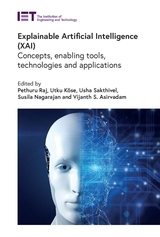

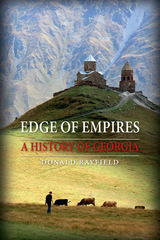
Beginning with the first intimations of the existence of Georgians in ancient Anatolia and ending with the volatile presidency of Mikheil Saakashvili, Rayfield deals with the country’s internal politics and swings between disintegration and unity, and divulges Georgia’s complex struggles with the empires that have tried to control, fragment, or even destroy it. He describes the country’s conflicts with Xenophon’s Greeks, Arabs, invading Turks, the Crusades, Genghis Khan, the Persian Empire, the Russian Empire, and Soviet totalitarianism. A wide-ranging examination of this small but colorful country, its dramatic state-building, and its tragic political mistakes, Edge of Empires draws our eyes to this often overlooked nation.

These studies, by a group of outstanding American theologians, canonists, and church historians, provide a great deal of evidence for the historical basis and continuing importance of bishops' conferences in the life of the church.
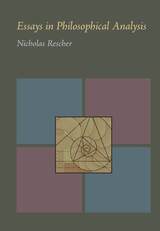

The Middle East has become an increasingly important place in the minds and concerns of the English-speaking world. This volume, originally published under the title Jerusalem Arabic, is the gold standard for anyone beginning to learn the Arabic spoken by Palestinians, or those who live in Syria or Lebanon.
Written in transcription using the Roman alphabet, the "Levantine" Arabic, or Jerusalem dialect, is a central Middle Eastern dialect and is recognized by Arabs virtually anywhere—in large part due to the Palestinian diaspora—and a good choice for anyone wishing to learn a base Arabic dialect. Enhanced by audio MP3 files—available for free download at www.press.georgetown.edu—Eastern Arabic provides the best available structured introduction to the essential features and vocabulary of spoken Palestinian Arabic.

In addition to providing the full text, Uihlein and the contributors trace Ricker’s career and delve into his practice of teaching. Subject experts explore specific topics. Thomas Leslie surveys contemporary construction practices in Chicago. Tom F. Peters considers Ricker’s writings in the context of the time while Rachel Will looks at masonry know-how and testing. Donald Friedman examines the teaching of iron and steel construction.
An illuminating look at a field and a legacy, The Elements of Construction rediscovers a figure that shaped the teaching of architecture and trained a generation that forever changed Chicago.
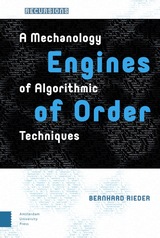


The central argument of this book is that journalists and audiences can no longer afford to pretend that all information is competing on an even playing field and that it is enough for journalists to simply publish “the facts.” Effective Journalism attempts to explain the reality, rather than the ideal, of how people seek and process information, and what journalists and their audiences can do to try to create an informed public in the face of that reality.
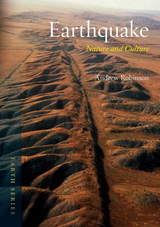

This volume contains 189 hitherto unpublished letters by Edwin Arlington Robinson. They were written between 1897 and 1930 to one of his first admirers, Edith Brower of Pennsylvania.
The letters begin when the twenty-seven-year-old poet writes gratefully to the stranger who has expressed appreciation of his first, privately printed, book of poems, The Torrent and the Night Before. Soon he was carrying on an intense correspondence, baring his soul—safely, he believed, because the woman he described as “infernally bright and not at all ugly,” with “something of a literary reputation,” was “too old to give me a chance to bother myself with any sentimental uneasiness.” (She was twenty-one years his senior.)
Continually reflecting his laconic, self-deprecating Yankee spirit, the letters range from the uncontrollable outpourings of a lonely individual, desperate for encouragement and understanding, to brief words of greeting or farewell. Without reserve, Robinson—who was eventually awarded the Pulitzer prize for poetry three times—confides his reactions to people and places, his thoughts about his own work, and his personal opinions of such writers as Browning, Dickens, Hardy, Moody, and Pater.
Mr. Cary has included Miss Brower’s unpublished memoir on the poet’s character and literary career, “Memories of Edwin Arlington Robinson,” and her penetrating review of The Children of the Night. In addition to an informative Introduction, he contributes full explanatory notes, a list of Robinson’s works, and an index.

Janine Rogers reveals that while humans associate eagles with light and learning, they also connect the birds to death and corruption. Eagles adorn flags, crests, and other emblems, but as she shows, they have also been relentlessly persecuted and perceived as predatory threats to livestock. While considering these contradictions, Rogers argues that eagles have suffered from the effects of human activities for years, from pesticide use to habitat destruction and global warming. She demonstrates the dangers of not saving eagles from destruction, as they are key to controlling pest populations and clearing carcasses. Featuring many illustrations of eagles in the wild, art, and popular culture, Eagle shines new light on our complex relationship with these birds, their international significance, and the dire implications of losing them to contemporary ecological threats.

Business is political. What are the ethics of it?
Businesses are political actors. They not only fund political campaigns, take stances on social issues, and wave the flags of identity groups – they also affect politics in their everyday hiring and investment decisions. As a highly polarized public demands political alignment from the powerful businesses they deal with, what’s a company to do?
Amit Ron and Abraham Singer show that the unavoidably political role of companies in modern life is both the fundamental problem and inescapable fact of business ethics: corporate power makes business ethics necessary, and business ethics must strive to mitigate corporate power. Because of its economic and social influence, Ron and Singer forcefully argue that modern business’s primary social responsibility is to democracy. Businesses must work to avoid wielding their power in ways that undermine key democratic practices like elections, public debate, and social movements. Pragmatic and urgent, Everyone’s Business offers an essential new framework for how we pursue profit—and democracy—in our increasingly divided world.

Drawing on anthropology, archaeology, folklore, and literature, Roth chronicles the global history of crime and punishment—from early civilizations to the outlawing of sex crimes and serial homicide to the development of organized crime and the threat today of global piracy. He explores the birth of the penitentiary and the practice of incarceration as well as the modern philosophy of rehabilitation, arguing that these are perhaps the most important advances in the effort to safeguard citizens from harm. Looking closely at the retributions societies have condoned, Roth also look at execution and its many forms, showing how stoning, hemlock, the firing squad, and lethal injection are considered either barbaric or justified across different cultures. Ultimately, he illustrates that despite advances in every level of human experience, there is remarkable continuity in what is considered a crime and the sanctions administered.
Perfect for students, academics, and general readers alike, this interdisciplinary book provides a fascinating look at criminality and its consequences.

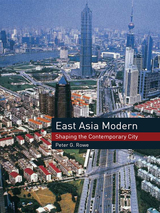
A renowned scholar on East Asian architecture and urbanism, Peter G. Rowe examines how the unique modernizing process of East Asian cities can be most usefully understood. Rowe offers a historical assessment of the region, chronicling the cities' development over the last century and setting into context their individual paths toward becoming modern. Rowe explains what the modernizing process has meant for the cultural diffusion of predominantly Western ideas, how East Asian urban regions have developed a distinct type of modernity, and what lessons can be gleaned from the contemporary East Asian experience. Refuting many common misconceptions about contemporary East Asian life, East Asia Modern offers a readable critical assessment of life in modern East Asia while also pointing to possibilities for the future.


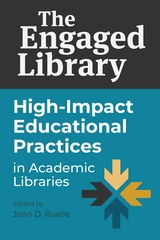

The publication in 1832 of An Essay on Calcareous Manures initiated an era of agricultural reform in the ante-bellum South. By 1850 Edmund Ruffin, seconded by John Taylor of Carolina, had effected a transformation of the economy of the upper South from poverty to agricultural prosperity. The essay's importance is not only regional, for in its four editions it presented Ruffin's theories to farmers who were facing the same problems of soil exhaustion in other parts of America. This small book, with its uncompromisingly descriptive title, is a landmark in the history of soil chemistry in the United States.
Ruffin read widely in the literature, mainly European, of agricultural chemistry, and in the 1820's he experimented with ways to make planting pay on his own tidewater Virginia lands. On the basis of his own research and frustrating experience as a farmer, he maintained that the capacity, of soil for enrichment by plant and animal manure is only relative to the original fertility of the soil. In other words, organic manures can only restore earth to what it was prior to cultivation. If land originally lacked the mineral ingredients essential to fertility, it would yield sparingly as long as the minerals were absent.
Ruffin found that uncultivated land in his part of Virginia lacked calcium carbonate, and that most of this same poor soil contained vegetable acid, the cause of its sterility. His solution was to plow in calcareous manure that is, earth containing calcium carbonate thus neutralizing the acid. When Ruffin first had his slaves dig up marl from one of the beds of fossilized shells that underlie much of coastal Virginia, and directed them to apply it to a test patch of his land, which was then planted with corn, he increased his yield by 40 per cent. This amazingly successful experiment led to others, and became what a contemporary of Ruffin called "the first systematic attempt wherein a plain, practical, unpretending farmer...has undertaken to examine into the real composition of the soils which he possesses and has to cultivate."

Mogens Rüdiger and Anna Åberg present a concise and timely history of energy production, trade, and consumption in Norden, starting with a review of the regional energy mix—from wind, solar, tide and wave, geothermal, biomass, nuclear, coal, and gas sources. Brief chapters describe the diversity of Nordic energy markets, assess how far the green transition has come, and explore what comes next as global crises, domestic politics, and technological developments present novel challenges and opportunities. Energy infrastructures and economic activities, Rüdiger and Åberg argue, serve as unique cultural focal points in the region. The coauthors summarize the national policy frameworks for the sector as well as the key energy and economic indicators used in infrastructure planning, regulation, and the opening of the electricity and gas markets to free competition.
Energy in the Nordic World is the essential primer to the power markets at the heart of Europe’s energy transition.

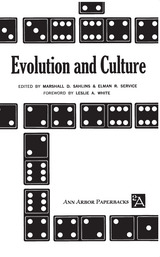
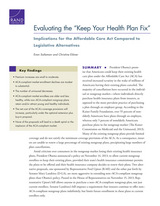

An Observer Architecture Book of the Year
Soaring income inequality and unemployment, expanding populations of the displaced and imprisoned, accelerating destruction of land and water bodies: today’s socioeconomic and environmental dislocations cannot be fully understood in the usual terms of poverty and injustice, according to Saskia Sassen. They are more accurately understood as a type of expulsion—from professional livelihood, from living space, even from the very biosphere that makes life possible.
“Saskia Sassen’s Expulsions describes the global forces that make ever more tenuous and fragile most people’s grip on the places where they live.”
—Rowan Moore, The Observer
“Coupled with her earlier work, this may be a paradigm breaking/making work.”
—Michael D. Kennedy, Contemporary Sociology
“Once again, sociologist Sassen uses her considerable knowledge to think creatively at both the local and global levels…In place of the principle of inclusion in the pre-1980s Keynesian era, the planet is increasingly dominated by a principle of exclusion of people, land, natural resources, and water. Sassen presents a powerful conceptual analysis and an equally powerful and timely call to action.”
—M. Oromaner, Choice
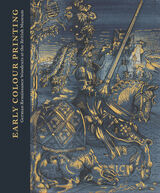
From artworks to missals and icons to wallpapers, this book breaks new ground by revealing the fascinating underlying technologies that enabled the production of these color-printed objects. Further, the volume offers significant new scholarship, pinpointing attributions to printers—not just to artists or designers. In doing so, it lays the groundwork for a new understanding of the history of print, one that encompasses all forms of printed material. Thoroughly researched and engagingly written, this collection guide will be a standard reference on German graphic art, early modern visual culture, and the history of printing itself.

In 1985 Boria Sax inherited an area of forest in New York State, which had been purchased by his Russian, Jewish, and Communist grandparents as a buffer against what they felt was a hostile world. For Sax, in the years following, the woodland came to represent a link with those who currently live and had lived there, including Native Americans, settlers, bears, deer, turtles, and migrating birds. In this personal and eloquent account, Sax explores the meanings and cultural history of forests from prehistory to the present, taking in Gilgamesh, Virgil, Dante, the Gawain poet, medieval alchemists, the Brothers Grimm, Hudson River painters, Latin American folklore, contemporary African novelists, and much more. Combining lyricism with contemporary scholarship, Sax opens new emotional, intellectual, and environmental perspectives on the storied history of the forest.

Starting in the Mississippi Delta and tracking the emblematic routes and highways of road music, John Scanlan explores the music and the life of movement it so often represented, identifying “the road” as the key to an existence that was uncompromising. He shows how the road became an inspiration for musicians like Jim Morrison and Bob Dylan and how these musicians also drew stimulus from a Beat movement that was equally enthralled with the possibilities of travel. He also shows how the quintessential American concepts of freedom and travel influenced English bands such as the Rolling Stones and Led Zeppelin. These bands may have been foreigners in the US, but they also found their spiritual home there—of blues and rock ‘n’ roll––and glimpsed the possibility of a new kind of existence, on the road.
Easy Riders, Rolling Stones is an entertaining, rich account of a key strand of American music history, and will appeal to both road music fans and music scholars who want to “head out on the highway.”

This volume is a study and edition of Bcom Idan ral gri's (1227-1305) Bstan pa rgyas pa rgyan gyi nyi 'od. Likely composed in the last decades of the thirteenth century, this systematic list of Buddhist Sutras, Tantras, Shastras, and related genres translated primarily from Sanskrit and other Indic languages holds an important place in the history of Buddhist literature in Tibet. It affords a glimpse of one Tibetan scholar's efforts to classify more than two thousand titles of Buddhist literature in the decades before the canonical collections known as the Bka' 'gyur and the Bstan 'gyur achieved a relatively stable form. Tibetan historiography traces the origin of the Bka' 'gyur and Bstan 'gyur to Bcom ldan ral gri's efforts, though the unique structure of the Bstan pa rgyas pa rgyan gyi nyi 'od, which differs greatly from available Bka' 'gyur and Bstan 'gyur catalogs, shows that the situation is more complex.
Known to contemporary scholars of Tibetan literature for some time through mention in other works, Bcom ldan ral gri's survey has recently become available for the first time in two manuscripts. The present work contains a detailed historical introduction, an annotated edition of the two manuscripts, as well as concordances and appendices intended to aid the comparative study of early Tibetan collections of Indic Buddhist literature.
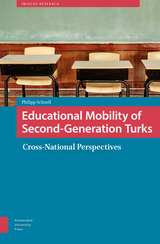
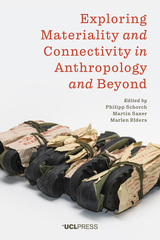
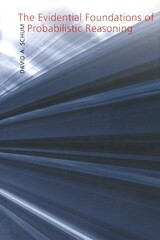
Synthesizing insights from law, philosophy and logic, probability, semiotics, artificial intelligence, psychology, and history, Schum provides a detailed examination of the various properties and uses of evidence and the evaluative skills evidence requires. Along with the evidential subtleties of probabilistic reasoning, Schum also explores the processes by which evidence is generated or discovered and looks at the intellectual and practical underpinnings of probabilistic reasoning. It is a useful resourse for students, researchers, and practitioners of every discipline concerned with evidence and its inferential use.

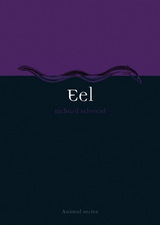
When pulled from the mud of creeks, ponds, rivers, or the sea, the eel, with its slick, snake-like body, emerges as an extremely mundane and even unappealing fish. But don’t let the appearance fool you—the eel has been one of the world’s favorite foods since ancient Greece, and the eel’s life cycle is one of the most remarkable on the planet—during the middle ages, impoverished Londoners survived on eel and the eel later saved the Mayflower pilgrims from starvation on American shores.
In Eel, RichardSchweid chronicles the many facets of these slippery creatures from their natural history to their market value and contemporary consumption to their appearance in art and literature and finally to their present threatened status. So far, eels have steadfastly refused to reproduce in captivity, apparently requiring the vastness of the open ocean to successfully mature—which has imperiled the species’ long-term survival. Schweid explains that freshwater eels are born in remote ocean depths and make a journey of thousands of miles to fresh water where they spend most of their lives before making a return journey to the ocean to mate and die.
Well-illustrated and containing many little-known facts about this surprising fish, Eel will appeal to general readers of natural history and others wishing to discover something more about the common unagi on the sushi menu.
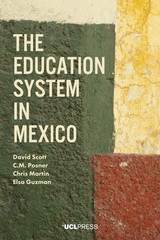

Accomplished printmaker and sculptor, avowed feminist, and lifelong activist Elizabeth Catlett (1915–2012) built a remarkable career around intersecting passions for formal rigor and social justice. This book, accompanying a major traveling retrospective, offers a revelatory look at the artist and her nearly century-long life, highlighting overlooked works alongside iconic masterpieces.
Catlett’s activism and artistic expression were deeply connected, and she protested the injustices of her time throughout her life. Her work in printmaking and sculpture draws on organic abstraction, the modernism of the United States and Mexico, and African art to center the experiences of Black and Mexican women. Catlett attended Howard University, studied with the painter Grant Wood, joined the Harlem artistic community, and worked with a leftist graphics workshop in Mexico, where she lived in exile after the US accused her of communism and barred her re-entry into her home country.
The book’s essays address a range of topics, including Catlett’s early development as an artist-activist, the impact of political exile on her work, her pedagogical legacy, her achievement as a social realist printmaker, her work with the arts community of Chicago’s South Side, and the diverse influences that shaped her practice.


What makes civil society organizations effective performers? What are key practices for businesses creating social value activities as a part of their overall operations? Business leaders have long analyzed corporate practices; this book represents an innovative analysis of how one does good in an effective and strategic manner. This book aims to enable social and business leaders to gain a greater understanding of how to achieve high performance in terms of social value creation.
Social Enterprise Knowledge Network is a research partnership encompassing eleven leading management schools—nine in Latin America, one in Spain, and Harvard Business School—with a demonstrated capacity to produce high-quality, original, field-based research in Latin America.
Based on the results of a two-year research process on how social and business organizations in Iberoamerica achieve superior social performance, Effective Management of Social Enterprises presents the most comprehensive and in-depth analysis of such practices ever undertaken in this region. This practitioner-oriented book also enriches the literature on organizational performance, social enterprise, and corporate social responsibility, and on Iberoamerica more generally.

Elfriede Jelinek and The Princess Plays includes an article on Jelinek’s changing position in the world of letters by Gitta Honegger, a leading Jelinek scholar and translator. Accompanying this major article is Honegger’s extended interview with the author; they discuss Jelinek’s aesthetic influences and ideas, what it’s like to win the Nobel Prize, and its implications for the writer. In addition to the first English-language publication of three short plays from Elfriede Jelinek’s Princess Plays, this issue of Theater includes Gitta Honegger’s extended and deeply personal interview with Jelinek, as well as Honegger’s article on her changing position in the world of letters since winning the 2004 Nobel Prize. The issue, which also includes articles on France’s Théâtre du Soleil, offers a compelling portrait of Jelinek and a rare introduction to her provocative theater.
Contributors. Duccio Bellugi, Gitta Honegger, Elfriede Jelinek, Robert Kluyver, Marina Kotzamani, Judith Miller, Ariane Mnouchkine, Béatrice Picon-Vallin, Anthony Richter, Gordon Rogoff, René Solis, Emmanuel Wallon, Philippa Wehle

Meditative missives.
Seneca, Lucius Annaeus, born at Corduba (Cordova) ca. 4 BC, of a prominent and wealthy family, spent an ailing childhood and youth at Rome in an aunt’s care. He became famous in rhetoric, philosophy, money-making, and imperial service. After some disgrace during Claudius’ reign he became tutor and then, in AD 54, advising minister to Nero, some of whose worst misdeeds he did not prevent. Involved (innocently?) in a conspiracy, he killed himself by order in 65. Wealthy, he preached indifference to wealth; evader of pain and death, he preached scorn of both; and there were other contrasts between practice and principle.
We have Seneca’s philosophical or moral essays (ten of them traditionally called Dialogues)—on providence, steadfastness, the happy life, anger, leisure, tranquility, the brevity of life, gift-giving, forgiveness—and treatises on natural phenomena. Also extant are 124 epistles, in which he writes in a relaxed style about moral and ethical questions, relating them to personal experiences; a skit on the official deification of Claudius, Apocolocyntosis (in LCL 15); and nine rhetorical tragedies on ancient Greek themes. Many epistles and all his speeches are lost.
The 124 epistles are collected in Volumes IV–VI of the Loeb Classical Library’s ten-volume edition of Seneca.

Meditative missives.
Seneca, Lucius Annaeus, born at Corduba (Cordova) ca. 4 BC, of a prominent and wealthy family, spent an ailing childhood and youth at Rome in an aunt’s care. He became famous in rhetoric, philosophy, money-making, and imperial service. After some disgrace during Claudius’ reign he became tutor and then, in AD 54, advising minister to Nero, some of whose worst misdeeds he did not prevent. Involved (innocently?) in a conspiracy, he killed himself by order in 65. Wealthy, he preached indifference to wealth; evader of pain and death, he preached scorn of both; and there were other contrasts between practice and principle.
We have Seneca’s philosophical or moral essays (ten of them traditionally called Dialogues)—on providence, steadfastness, the happy life, anger, leisure, tranquility, the brevity of life, gift-giving, forgiveness—and treatises on natural phenomena. Also extant are 124 epistles, in which he writes in a relaxed style about moral and ethical questions, relating them to personal experiences; a skit on the official deification of Claudius, Apocolocyntosis (in LCL 15); and nine rhetorical tragedies on ancient Greek themes. Many epistles and all his speeches are lost.
The 124 epistles are collected in Volumes IV–VI of the Loeb Classical Library’s ten-volume edition of Seneca.

Meditative missives.
Seneca, Lucius Annaeus, born at Corduba (Cordova) ca. 4 BC, of a prominent and wealthy family, spent an ailing childhood and youth at Rome in an aunt’s care. He became famous in rhetoric, philosophy, money-making, and imperial service. After some disgrace during Claudius’ reign he became tutor and then, in AD 54, advising minister to Nero, some of whose worst misdeeds he did not prevent. Involved (innocently?) in a conspiracy, he killed himself by order in 65. Wealthy, he preached indifference to wealth; evader of pain and death, he preached scorn of both; and there were other contrasts between practice and principle.
We have Seneca’s philosophical or moral essays (ten of them traditionally called Dialogues)—on providence, steadfastness, the happy life, anger, leisure, tranquility, the brevity of life, gift-giving, forgiveness—and treatises on natural phenomena. Also extant are 124 epistles, in which he writes in a relaxed style about moral and ethical questions, relating them to personal experiences; a skit on the official deification of Claudius, Apocolocyntosis (in LCL 15); and nine rhetorical tragedies on ancient Greek themes. Many epistles and all his speeches are lost.
The 124 epistles are collected in Volumes IV–VI of the Loeb Classical Library’s ten-volume edition of Seneca.

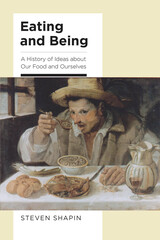
Eating and Being is a history of Western thinking about food, eating, knowledge, and ourselves. In modern thought, eating is about what is good for you, not about what is good. Eating is about health, not about virtue. Yet this has not always been the case. For a great span of the past—from antiquity through about the middle of the eighteenth century—one of the most pervasive branches of medicine was known as dietetics, prescribing not only what people should eat but also how they should order many aspects of their lives—including sleep, exercise, and emotional management. Dietetics did not distinguish between the medical and the moral, nor did it acknowledge the difference between what was good for you and what was good. Dietetics counseled moderation in all things, where moderation was counted as a virtue as well as the way to health. But during the nineteenth century, nutrition science began to replace the language of traditional dietetics with the vocabulary of proteins, fats, carbohydrates, and calories, and the medical and the moral went their separate ways. Steven Shapin shows how much depended upon that shift, and he also explores the extent to which the sensibilities of dietetics have indeed been lost.
Throughout this rich history, he evokes what it felt like to eat during another historical period and he invites us to reflect on what it means to feel about food as we now do. Shapin shows how the change from dietetics to nutrition science fundamentally changed how we think about our food and its powers, our bodies, and our minds.

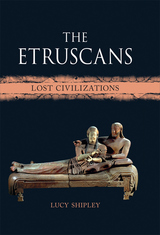
The Etruscans were a powerful people, marked by an influential civilization in ancient Italy. But despite their prominence, the Etruscans are often portrayed as mysterious—a strange and unknowable people whose language and culture have largely vanished. Lucy Shipley’s The Etruscans presents a different picture.
Shipley writes of a people who traded with Greece and shaped the development of Rome, who inspired Renaissance artists and Romantic firebrands, and whose influence is still felt strongly in the modern world. Covering colonialism and conquest, misogyny and mystique, she weaves Etruscan history with new archaeological evidence to give us a revived picture of the Etruscan people. The book traces trade routes and trains of thought, describing the journey of Etruscan objects from creation to use, loss, rediscovery, and reinvention. From the wrappings of an Egyptian mummy displayed in a fashionable salon to the extra-curricular activities of Bonaparte, from a mass looting craze to a bombed museum in a town marked by massacre, the book is an extraordinary voyage through Etruscan archaeology, which ultimately leads to surprising and intriguing places.
In this sharp and groundbreaking book, Shipley gives readers a unique perspective on an enigmatic people, revealing just how much we know about the Etruscans—and just how much still remains undiscovered.

In an intellectually engaging narrative that mixes science and history, theories and personalities, Pat Shipman asks the question: Can we have legitimate scientific investigations of differences among humans without sounding racist?
Through the original controversy over evolutionary theory in Darwin's time; the corruption of evolutionary theory into eugenics; the conflict between laboratory research in genetics and fieldwork in physical anthropology and biology; and the continuing controversies over the heritability of intelligence, criminal behavior, and other traits, the book explains both prewar eugenics and postwar taboos on letting the insights of genetics and evolution into the study of humanity.

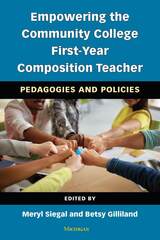
This volume is an inquiry into community college first-year pedagogy and policy at a time when change has not only been called for but also mandated by state lawmakers who financially control public education. It also acknowledges new policies that are eliminating developmental and remedial writing courses while keeping mind that, for most community college students, first-year composition serves as the last course they will take in the English department toward their associate’s degree.
Chapters focusing on pedagogy and policy are integrated within cohesively themed parts: (1) refining pedagogy; (2) teaching toward acceleration; (3) considering programmatic change; and (4) exploring curriculum through research and policy. The volume concludes with the editors’ reflections regarding future work; a glossary and reflection questions are included.
This volume also serves as a call to action to change the way community colleges attend to faculty concerns. Only by listening to teachers can the concerns discussed in the volume be addressed; it is the teachers who see how societal changes intersect with campus policies and students’ lives on a daily basis.
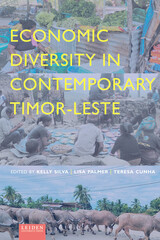

This is the second edition of Andrew Simms's highly regarded guide to ecological debt.
Simms shows how millions of us in the West are running up huge ecological debts: from the amount of oil and coal that we burn to heat our houses and run our cars, to what we consume and the waste that we create, the impact of our lifestyles is felt worldwide. Whilst these debts go unpaid, millions more living in poverty in the majority world suffer the burden of paying dubious foreign financial debts.
The book explores a great paradox of our age: how the global wealth gap was built on ecological debts, which the world's poorest are now having to pay for. Highlighting how and why this has happened, he also shows what can be done differently in the future. Now updated throughout, this is a clear and passionate account of the steps we can take to stop pushing the planet to the point of environmental bankruptcy.
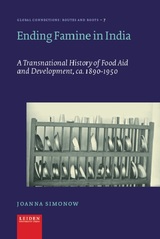
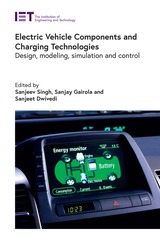
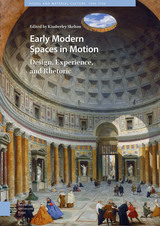
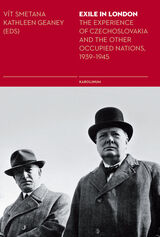

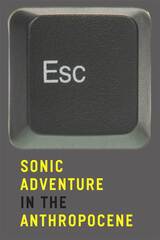
ESC takes as its point of departure the CBS Radio adventure series Escape (1947–54). The postwar years saw both a decline in popularity for American radio drama, and the dawn of the Anthropocene era, with human beings emerging as the primary force affecting the earth’s systems.
Jacob Smith considers Escape’s adventure stories from an ecocritical perspective, analyzing the geographic, sociopolitical, and ecological details of the stories to reveal how they are steeped in social and environmental history.
The work of contemporary sound artists and field recordists underscores the relevance of sound in these narratives and demonstrates audio’s potential as a key medium for scholarship. ESC features recordings by some of the most prominent sound artists working in this area, including Daniel Blinkhorn, Peter Cusak, David Dunn, JLIAT, Christina Kubisch, Francisco López, Sally Ann McIntyre, Chris Watson, and Jana Winderen.
ESC makes the urgency of our critical ecological moment audible in a new way. The audio essays articulate what it means to live in an Anthropocene era and posit alternative ways of conceptualizing our historical moment. ESC sharpens our ability to listen and respond to our world with greater ecological awareness.
All publication resources for ESC, including the introductory essay, audio materials, and backmatter, are available on Fulcrum. The audio materials are also available on Apple Podcasts.
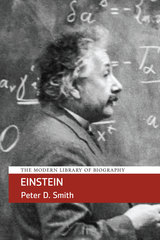


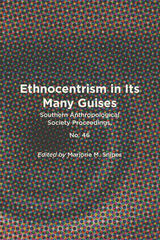
Ethnocentrism in Its Many Guises gathers essays on a topic of urgent concern. Marjorie Snipes’s introduction chronicles the treatment of ethnocentrism within the discipline of anthropology. Christine Kovic decries the ethnocentrism codified in immigration law that has led to thousands of deaths at the US–Mexico border. Brandon Lundy’s and Kezia Darkwah’s ethnographic research among labor migrants in Cabo Verde demonstrates how communities undergoing immigration pressures react to outsiders in complex ways. Yeju Choi contends that Canada’s Truth and Reconciliation Commission failed to heal the wounds inflicted by a century of cultural genocide because the process did not fully engage and respect the worldview of Aboriginal peoples. Using the example of Rapa Nui, Kathleen and Daniel Ingersoll note how we project and privilege our own values when we observe other cultures and historical periods. Ayla Samli argues that both the nutritionally deficient Standard American Diet and our federal supplemental nutrition programs are limited and ethnocentric. Michael Blum explains how the Wu-Tang Clan’s music can be understood as a site of resistance against American racism.
These papers were presented at the 2017 annual meeting of the Southern Anthropological Society (SAS) in Carrollton, Georgia.
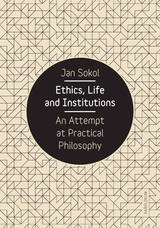
With few exceptions, moral philosophy considers the acting person to be an autonomous, independent individual pursuing his or her own happiness. But in the context of social institutions—for example, in workplaces—it is often an organization’s goals, not an individual’s, that take precedence. In complex networks of organizations, morals take a different shape. Divided into three parts, this book begins by exploring basic notions such as freedom, life, responsibility, and justice, and their relationship to practical philosophy; looks to the main schools of Western thought in the search for a common moral foundation; and reintroduces the forgotten idea of biological and cultural heritage—an idea that could prove fundamental in addressing our responsibility not only to human lives, but also to the natural world. In a closing analysis, Sokol brings all of these moral concepts to bear on problems connected to the growing complexity of institutions, offering hope for a practical philosophy for the modern world.
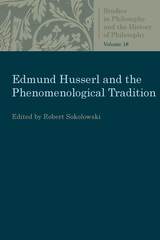

In 1904, Edmund J. James inherited the leadership of an educational institution in search of an identity. His sixteen-year tenure transformed the University of Illinois from an industrial college to a major state university that fulfilled his vision of a center for scientific investigation.
Winton U. Solberg and J. David Hoeveler provide an account of a pivotal time in the university’s evolution. A gifted intellectual and dedicated academic reformer, James began his tenure facing budget battles and antagonists on the Board of Trustees. But as time passed, he successfully campaigned to address the problems faced by women students, expand graduate programs, solidify finances, create a university press, reshape the library and faculty, and unify the colleges of liberal arts and sciences. Combining narrative force with exhaustive research, the authors illuminate the political milieu and personalities around James to draw a vivid portrait of his life and times.
The authoritative conclusion to a four-part history, Edmund J. James and the Making of the Modern University of Illinois, 1904–1920 tells the story of one man’s mission to create a university worthy of the state of Illinois.
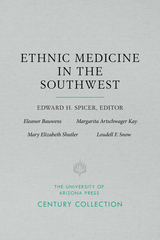
Edward H. Spicer's informative Introduction sets the stage for comparing "popular" and "scientific" medicine. "Graduates of medical schools have been taught that their body of knowledge is the one true medical tradition. The world has many medicines and thousands of practitioners who do not believe that "Western" medicine is a universal cure-all. These practitioners may be as certain that what they practice is the one true medical tradition," says Spicer. In the communities studied, the belief is that illnesses may be caused by overwork, withcraft or sin, and treatment may include herbs, prayer, or massage. Practitioners are successful and respected although they are not licenses in the legal sense.
In these alternative medical traditions, "Western" medicine may find a key to new growth and effectiveness. Ethnic Medicine in the Southwest is a fascinating look at commonly practiced arts that will interest not only ethnic and health services specialists but all those interested in cultural traditions.




Winner of the ARSC Award for Excellence in the Field of Recorded Country, Folk, or Ethnic Music, 1991.


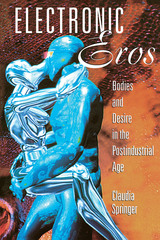
The love affair between humans and the machines that have made us faster and more powerful has expanded into cyberspace, where computer technology seems to offer both the promise of heightened erotic fulfillment and the threat of human obsolescence. In this pathfinding study, Claudia Springer explores the techno-erotic imagery in recent films, cyberpunk fiction, comic books, television, software, and writing on virtual reality and artificial intelligence to reveal how these futuristic images actually encode current debates concerning gender roles and sexuality.
Drawing on psychoanalytical and film theory, as well as the history of technology, Springer offers the first sustained analysis of eroticism and gender in such films as RoboCop, The Terminator, Eve of Destruction, and Lawnmower Man; cyberpunk books such as Neuromancer, Count Zero, Virtual Light, A Fire in the Sun, and Lady El; the comic books Cyberpunk and Interface, among others; and the television series Mann and Machine. Her analysis demonstrates that while new electronic technologies have inspired changes in some pop culture texts, others stubbornly recycle conventions from the past, refusing to come to terms with the new postmodern social order.
Written to be accessible and entertaining for students and general readers as well as scholars, Electronic Eros will be of interest to a wide interdisciplinary audience.


Edward Taylor - American Writers 52 was first published in 1965. Minnesota Archive Editions uses digital technology to make long-unavailable books once again accessible, and are published unaltered from the original University of Minnesota Press editions.

Now in its second edition, Economics for Everyone is an antidote to the abstract and ideological way that economics is normally taught and reported. Key concepts such as finance, competition, and wages are explored, and their importance to everyday life is revealed. Stanford answers such questions as “Do workers need capitalists,” “Why does capitalism harm the environment,” and “What really happens on the stock market.”
Illustrated with humorous and educational cartoons by Tony Biddle, and supported with a comprehensive set of web-based course materials for popular economics courses, this book will appeal to students of social sciences who need to engage with economics as well as anyone seeking to better understand today’s economy.
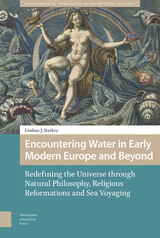
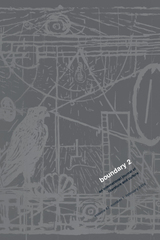
This issue theorizes what questions of value might contribute to our understanding of sound and music. Divesting sound and music from notions of intrinsic value, the contributors follow various avenues through which sound and music produce value in and as history, politics, ethics, epistemology, and ontology. As a result, the very question of what sound and music are—what constitutes them, as well as what they constitute—is at stake. Contributors examine the politics of music and crowds, the metaphysics of sensation, the ecological turn in music studies, and the political resistance inherent to sound; connect Karl Marx to black music and slave labor; look at Marx, the Marx Brothers, and fetishism; and explore the tension between the voice of the Worker who confronts Capital head-on and the voices of actual workers.
Contributors: Amy Cimini, Bill Dietz, Jairo Moreno, Rosalind Morris, Ana María Ochoa Gautier, Ronald Radano, Gavin Steingo, Peter Szendy, Gary Tomlinson, Naomi Waltham-Smith
The first comprehensive account of the major disease-eradication campaigns from the early twentieth century right up to the present, Eradication places these ambitious goals in their broad historical and contemporary contexts. From the life and times of the American arch-eradicationist Dr. Fred Lowe Soper (1893-1977), who was at the center of many of the campaigns and controversies surrounding eradication in his lifetime, to debates between proponents of primary health care approaches to ill health versus the eradicationists, Nancy Leys Stepan’s narrative suggests that today these differing public health approaches may be complementary rather than in conflict. Enlightening for general readers and specialists alike, Eradication is an illuminating look at some of the most urgent problems of health and disease around the world.

Each essay in these special issues proceeds from a different perspective. Two essays compare the ideas of Shklovsky with those of equally well-known thinkers—such as Hannah Arendt and Mikhail Bakhtin—regarding freedom and aesthetics. Other essays are historical surveys of estrangement theories and their diasporas during the last century. One contributor considers Diderot's views on art alongside certain modern views on poetry. Another discusses estrangement as seen in the visual artwork of the Russian painter and art theoretician Kazimir Malevich. A third contributor explores estrangement in the work of Dostoyevsky. The special issues end with a previously unpublished interview with Shklovsky, who looks back on a long and troubled career, speaking his mind about literary issues, Communist oppression, and friends and enemies, including Stalin.
Contributors. Svetlana Boym, Marietta Chudakova, Jacob Edmond, Caryl Emerson, Michael Holquist, Anna Wexler Katsnelson, Ilya Kliger, Nancy Ruttenburg, Greta N. Slobin, Tatiana Smoliarova, Meir Sternberg, Galin Tihanov, Cristina Vatulescu
Meir Sternberg is Professor of Poetics and Comparative Literature at Tel Aviv University. Svetlana Boym is Curt Hugo Reisinger Professor of Slavic Languages and Literatures, and Professor of Comparative Literature, at Harvard University.

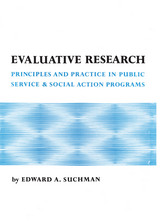
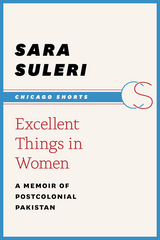
Sometimes, only the most heartbreaking memories possess the capacity—in their elegiac immediacy—to take our breath away. With Excellent Things in Women, Sara Suleri offers the reader a delicately wrought memoir of life in postcolonial Pakistan. Suleri intertwines the violent history of Pakistan's independence with her own intimate experiences—relating the tumult of growing up female during a time of fierce change in the Middle East in the 1960s and ’70s. In the two selections presented here, “Excellent Things in Women” and “Meatless Days,” we watch as Suleri re-encounters the relationships that inform her voyage from adolescence to womanhood—with her Welsh mother; her Pakistani father, prominent political journalist Z. A. Suleri; and her tenacious grandmother, Dadi, along with her five siblings—as she comes to terms with the difficulties of growing up and her own complicated passage to the West.
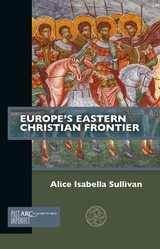


“Blood,” Goethe observed in Faust, “is a very special juice.” How special it is and how complex as well is revealed in Douglas Surgenor’s Edwin J. Cohn and the Development of Protein Chemistry.
As Surgenor aptly shows, what began as a modest program in basic research at the Harvard Medical School in 1920 with the establishment of a small laboratory for the study of the physical chemistry of proteins, suddenly and quite unexpectedly took on immensely practical proportions twenty years later when the onset of World War II made requisite new sophisticated blood techniques and blood substitutes for the treatment of military casualties.
The knowledge and expertise gained by Edwin Cohn and his laboratory associates in the study of proteins, amino acids, and peptides in blood after 1920 put them in a unique position to carry out the search for new blood products. Edwin J. Cohn and the Development of Protein Chemistry discloses how the wartime emergency called into play Cohn’s talents as a leader who drew together chemists, clinicians, pathologists, immunologists, and others in the attainment of a complex goal. The revolution Cohn started has still not run its course.
READERS
Browse our collection.
PUBLISHERS
See BiblioVault's publisher services.
STUDENT SERVICES
Files for college accessibility offices.
UChicago Accessibility Resources
home | accessibility | search | about | contact us
BiblioVault ® 2001 - 2024
The University of Chicago Press









